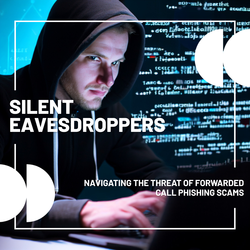AI Meeting Notetakers: Navigating Privacy and Security

In an era where artificial intelligence (AI) seamlessly integrates into our daily workflows, AI notetakers in online meetings have become a new frontier for innovation. As an (MSP) specializing in Cybersecurity for regulated industries, we've observed an ever-increasing uptick in deploying these tools during professional interactions. While these AI notetakers promise efficiency and improved productivity, they also bring forth significant concerns regarding privacy and cybersecurity.
The Draw and the Drawback
AI notetakers, leveraging machine learning for natural language processing, offer more than transcriptions; they provide meeting summaries, highlight key discussions, and even generate task lists. However, the sophistication of these tools raises critical questions about the potential risks involved, particularly around privacy and data security.
Consent and Confidentiality
One of the primary concerns is the obtaining of proper consent. The law in many jurisdictions requires that all participants in a meeting agree to be recorded, a requirement that becomes logistically complicated when participants are spread across different legal territories. Additionally, an AI tool recording and analyzing conversations can inhibit open discussion, potentially limiting the productivity of meetings.
The issue of data privacy is particularly pertinent. With regulations like the GDPR in Europe and the CCPA in California setting stringent guidelines for data handling, the use of AI notetakers introduces a complex web of compliance requirements. The risk of data breaches and unauthorized access to sensitive information, such as trade secrets and personal employee information, cannot be overstated.
Legal and Ethical Considerations
Legal challenges also abound regarding attorney-client privilege and the potential waiver of such privileges when information is shared with or stored by a third-party service provider. Additionally, the bias and context issues inherent in AI technologies could lead to misunderstandings or misinterpretations that might affect the integrity of the meeting outcomes.
Best Practices for Organizations
For organizations considering using an AI notetaker, it's crucial to develop robust policies and practices. This includes carefully selecting vendors that comply with relevant privacy laws and ensuring that all meeting participants are informed and have consented to the recording. Regular audits and checks for bias and accessibility are also essential to ensure these tools serve their intended purpose without compromising ethical standards or legal requirements.
Conclusion
As a leading MSP focusing on cybersecurity, Delaney Computer Services, Inc. emphasizes the importance of cautiously adopting AI in meetings. The potential benefits of AI notetakers, as are the privacy and security risks, are significant. Organizations must weigh these considerations carefully, prioritize transparency and consent, and adhere strictly to privacy laws to navigate this evolving landscape successfully.
Integrating AI into our professional lives is inevitable, but it must be done with a keen awareness of the implications for privacy and security. By adopting a proactive and informed approach, businesses can leverage AI to enhance productivity without compromising on the fundamental values of trust and confidentiality that underpin professional relationships.
